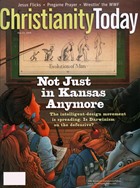Nancy Pearcey: We’re not in Kansas Anymore
 Nancy Pearcey, “We’re not in Kansas Anymore: Why secular scientists and media can’t admit that Darwinism might be wrong” Christianity Today (May 22, 2000), pages 42-49.
Nancy Pearcey, “We’re not in Kansas Anymore: Why secular scientists and media can’t admit that Darwinism might be wrong” Christianity Today (May 22, 2000), pages 42-49.
The Associated Press voted that the Kansas controversy was the top story of 1999. And what a controversy it was. A straight-A sophomore put up her hand in biology class and asks, “Mr. Roth, when are we going to learn about creationism?” Then the teacher explodes with, “When are you going to stop believing that crap your parents teach you?” The subsequent forced early-retirement of the teacher and vote of the Kansas Board of Education to “de-emphasize” the speculative aspects of evolution became the coal bed for a hot national debate.
This article takes a look at the origins debate by looking at what the secular scientists and media are saying and the response from the broad Intelligent Design movement (IDM). If you want to know the latest happenings in this debate, or need an introduction to the whole question of origins, this article will give you a succinct overview. Pearcey represents the IDM well, showing how many Christian scientists and “creationists” have moved away from infighting over the details (such as: is the earth young? Could God use an evolutionary process?) to confront the real issue: Does science demonstrate that Someone made this? The IDM has realized that the stakes are people’s lives and that wrangling over those details only ruins the Christian’s witness to the secular humanist scientific community. Those details are important, but not at the cost of presenting the inescapable necessity of a Designer.
Pearcey says that, “While ID does not require any theological presuppositions, it has theological implications: it is resolutely opposed to the atheistic, purposeless, chance view of evolution taught in the power centers of science” (p. 48). But is Darwinian naturalistic evolution opposed outright to religion? Pearcey argues that this is the very thing that this Kansas controversy and the IDM are bringing to the forefront, “for every scientist who soothingly intones that evolution can coexist peacefully with religion, there is another who openly proclaims its antitheistic implications” (p. 48).
“This suggests a final theme emerging from the Kansas controversy—the refusal by so many to acknowledge that religion is genuinely at stake in this issue. Pervasive throughout the editorials and columns was the argument that the folks in Kansas were mistaken to see mainstream evolutionism as posing any contradiction to religion. The underlying assumption is that science is a matter of facts and reason, while religion is a matter of faith—and never the twain shall meet” (p. 48). However, it is becoming apparent that the reality of this opposition is the case. “The Gallup Poll has consistently shown (most recently in August 1999) that only about 10 percent of Americans believe life evolved strictly by chance and natural forces. Roughly 90 percent of Americans believe that God created life either directly or by guiding a gradual process. This large majority is beginning to suspect that Darwinism is less about objective science than about maintaining cultural power” (p. 49).
In this same issue of CT you will find an interview with Pulitzer-Prize winning author Edward J. Larson. Larson says that Christians should be taught evolution and that if the IDM is going to be successful it must get scientists to begin to “do” intelligent design. Larson’s book Summer for the Gods: The Scopes Trial and America’s Continuing Debate Over Science and Religion (1997) definitely made some waves in the already troubled waters of the origins debate. Larson’s survey, conducted with Larry Witham, found this interesting statistic about scientists and religious belief: Just as James Leuba found in 1914 and 1933, about 40 percent of the rank-and-file scientists believe in a theistic God (as understood by traditional Christians, Jews and Muslims) and there is a much lower belief percentage among the scientific elite.


